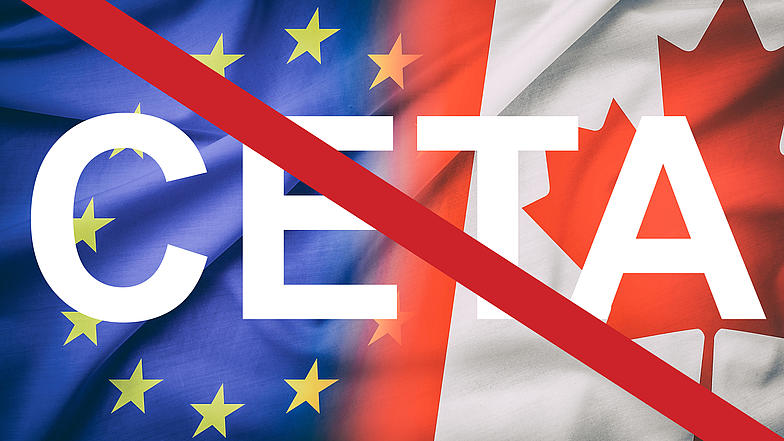CETA’s Committees can make far reaching decisions on health, consumer, and environmental standards behind closed doors without democratic control. foodwatch warns of the potential negative impact on EU citizens.
The trade agreement between the EU and Canada has serious democratic deficits, says a legal opinion by Prof. Dr. Wolfgang Weiß, published by foodwatch.
In particular, the opinion stresses the serious lack of democratic control and transparency of the CETA committees. In the secret meetings of the committees, representatives of the
Canadian government and the EU Commission can make far-reaching decisions, for example on hygiene controls of meat imports or the recognition of the equivalence of pesticide safety standards. The committees can therefore make important decisions on health and consumer protection in Europe without the democratic control of European or national parliaments.
The European Parliament cannot co-decide; it is only informed. There are also no other mechanisms of parliamentary or public accountability of the CETA committees for their decisions.Professor of International Law at the University of Speyer
CETA jeopardises consumer protection
CETA, is a so-called ”new generation” trade agreement that does not only reduce custom duties or subsidies, but also aims to reduce “non-tariff barriers”. These include consumer, health and environmental protection standards which are higher in Europe, compared to most of the rest of the world.
However, the decisions on the elimination of “non-tariff barriers” are not made by elected representatives, but by government representatives in the CETA committees. And, the EU cannot withdraw from these decisions unilaterally. Even if the EU Member States decided to improve on safety standards for pesticides this rule could not apply to Canada’s products without Canada’s consent. Since rules that contradict CETA commitments are "automatically a violation of international law", CETA will "effectively freeze standards of protection", says Prof. Weiß’ legal opinion.
Another example are import controls on food. The responsible CETA committee has the right to change the frequency of import controls. "This means that the control standards could be lowered at any time in the future by decisions of the committee. (...) This would lead to insufficient health protection for consumers in the EU," warns Prof. Weiß.
If CETA finally enters into force, there is a risk that consumer and environmental protection standards will be frozen at a low level or even lowered - without elected representatives deciding on it.Founder and executive director of foodwatch
National parliaments in 12 EU Member States can still stop CETA!
CETA has already been adopted by the European Parliament and the heads of government in the European Council. Since 2017 CETA is provisionally applied. Today, the ratification process is still pending in 12 EU Member States . If one single country says "no", CETA is off the table.
foodwatch is calling upon the national parliaments to vote with “NO” on CETA! By approving CETA, parliamentarians would give a blank cheque to the CETA committees to make far reaching decisions with potentially serious impacts on EU citizens. Politicians are literally disempowering themselves.
foodwatch calls strongly on parliamentarians: You are representing the interest of EU citizens – stop CETA while you still can!
Sources and further information:
Legal Opinion: Transparency, Decision-Making Powers and Democratic Accountability in CETA prepared on behalf of foodwatch by Prof. Dr. Wolfgang Weiss, University of Speyer
